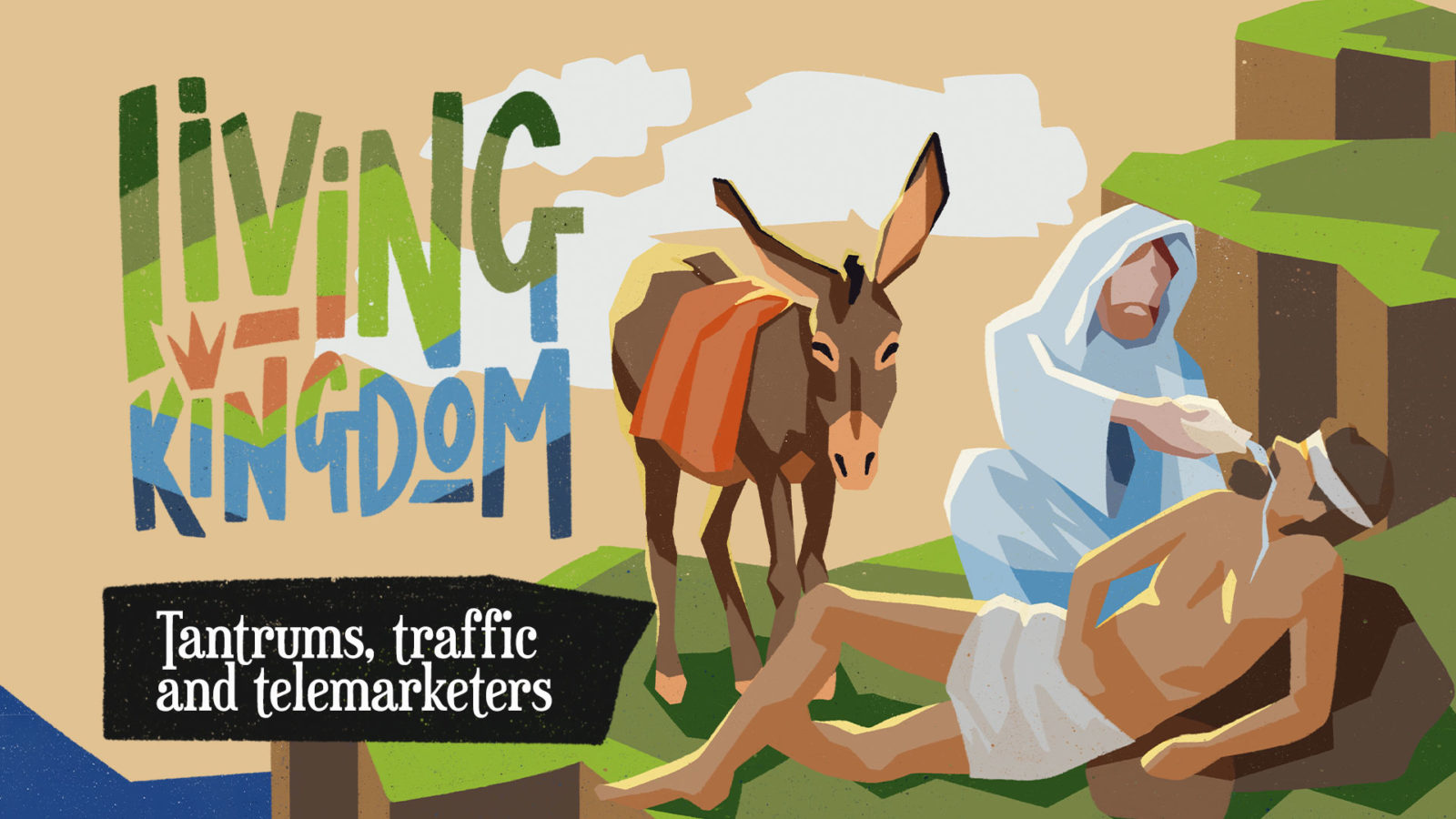The Good Samaritan
“By chance a priest came along. But when he saw the man lying there, he crossed to the other side of the road and passed him by. A Temple assistant walked over and looked at him lying there, but he also passed by on the other side.” (Luke 10:31,32).
Tap tap. Knuckles softly patted my bedroom door. I grunted and kept typing—louder—to remind whoever it was that I was incredibly busy.
Knock knock.“Argh!” I yelled, exasperated. “What on EARTH could you POSSIBLY want?!”
My sister peeped her nose through the door, a gentle smile on her face. “Ahh, I was just wondering if you wanted some orange juice? I made it for you,” she said sweetly. “Sorry for interrupting . . .”
There was a pause.
“Oh . . . right, you can just leave it there,” I said, sheepishly. I couldn’t even give her eye contact. “Th—thanks.”
The door closed again, leaving guilt and I trapped inside.
Oh God, why am I like this? I cringed, staring at the tall glass of affectionately squeezed orange juice. I felt like the worst sister on the planet. I should say sorry, I thought, pondering the awkward dismount from my lofty high horse and stumbling through an apology.
But like every other time, I just kept typing away, quickly burying my guilt under layers of work, appointments and expectations. I’ll make it up to her later, I promised myself. And I won’t be horrible like that, ever again!
But I was horrible again . . . at least three more times that week. And each time, despite intending to apologise, I just kept powering forward, pretending that it never happened. I needed to ignore distractions and hindrances in order to be—or appear to be—productive and successful, even if that meant neglecting my emotional health, abandoning my relationships or failing to show God’s love to others.
Had my sister done something to deserve an angry response? Far from it. Was I a heated and confrontational person? Not usually. The reason for my outburst wasn’t personal. It was the byproduct of intense hurry, stress and overwhelm, and any interruption—whether from some orange juice, a faulty internet connection or extra traffic on the road—seemed to unleash an unloving, self-centred side of me that I couldn’t seem to control.
In his teaching on the spiritual danger of hurry, Christian pastor and author John Mark Comer suggests that how we respond to interruptions—those unplanned moments where we don’t have time to craft a text message or work through our emotions before reacting—is one of the strongest indicators of our true character. Clearly, mine needs a lot of work.
In contrast to myself, Jesus embraced interruptions. In fact, most of the parables He shared and miracles He performed were responses to interruptions. Healing the paralytic (Matthew 9:1-8) and Jairus’ daughter (Mark 5:21-43), feeding the 5000 (Matthew 14:13-21) or calming the storm (Mark 4:35-41) are just a few instances where people interrupted Jesus and brought their problems or their friends’ problems to Him. And there isn’t a single documented time that He rejected them. He never started typing louder, never yelled or complained or walked away. Every interruption He met with love.
The Parable of the Good Samaritan is no exception. Jesus told this story in response to an interruption from one of the experts in the law who asked Him, “what must I do to inherit eternal life?” (Luke 10:25). Rather than giving a quick answer or getting frustrated by his short-sightedness, Jesus took interest and told a story. And you’ve probably heard it before:
A Jewish man was attacked and beaten by robbers when travelling the road from Jerusalem to Jericho. Both a priest and a Levite—the people you would expect to show love and compassion—saw him and ignored him. Instead, it was a Samaritan—an arch-enemy of the Jews—who bandaged the man’s wounds, put him on his donkey, brought him to an inn, cared for him for 24 hours, and then paid two days wages for his continued care (vv34,35). Unlike the priest and Levite, this man was incredibly generous and compassionate, sacrificing significant time and money and choosing to look beyond racial, social and personal differences in order to love his “enemy”.
After telling the story, Jesus asked the teacher, “Which of these three do you think was a neighbour to the man who fell into the hands of robbers?” (v36). The teacher of the law hesitated. He couldn’t even bring himself to use the word “Samaritan”. For the Jews, the phrase “Good Samaritan” was an oxymoron—akin to saying “good sex-offender” or “lovely murderer” today. So great was the rift between Jews and Samaritans that the concept probably didn’t even compute.
But let’s not be too theoretical about this. The Good Samaritan isn’t simply an exegesis about who is and isn’t our neighbour, nor is it merely a suggestion about how to be a better person. It’s a practical lesson on how to inherit eternal life; a salvational issue, part and parcel of the greatest commandment (v25). We see how Jesus separates the sheep from the goats based on their treatment of others. We know we should be doing more for the poor, needy and disadvantaged. We want to be more generous and charitable. And yet—just like my intention to apologise to my sister—the feeling is usually short-lived and soon overtaken by life’s frenetic pace. Our best intentions seldom translate into practical actions.
Why is this? Perhaps it’s because we focus on the wrong thing. The mistake we often make when reading the Good Samaritan story is to frame the parable around being more like the Samaritan. We make a mental checklist: send that sympathy card, bake dinner for a neighbour, give money to the homeless man en route to work—and don’t get me wrong, these things are great. But the problem is that in our 21st century hustle culture, trying to “add on” outreach and others-centred love to an already full-to-over-flowing life schedule is unrealistic and unsustainable.
Perhaps we need to focus more on the other characters in the story. We are not like the Samaritan who seems to have bountiful time on his hands to help a brother in need. We are a generation of priests and Levites—of preoccupied, time-poor, priority-driven, efficiency-drunk people. We are the ones who see suffering and walk on by, convinced that the system will fix the problem for us or that we have more important priorities. We want to help others, but we don’t follow through because we are too busy and because we frame interruptions as hindrances rather than blessings.
Renowned Christian author CS Lewis challenges this mindset. “The great thing,” he says, “If one can, is to stop regarding all the unpleasant things as interruptions of one’s ‘own,’ or ‘real’ life. The truth is of course that what one calls the interruptions are precisely one’s real life—the life God is sending one day by day” (Collected Letters Volume 2, 2009).
The reason the priest and the Levite didn’t attend to the suffering man wasn’t because they were bad people. On the contrary, the Levite may have been rushing to a shift at work. The priest may have been returning to his family with tithe—with food and goods given to him at the Temple—that he didn’t want to throw away by becoming ceremonially unclean and touching a dead body (Numbers 5:2). Both men probably wanted to help but lacked one crucial thing: margins.
To borrow Pastor Comer’s words, in order to be effective disciples for Jesus, we need to create space “in the margins” of our lives. Rather than adding more “Jesus stuff” into our already stuffed schedules (a quick recipe for burnout), we need to start culling. Ruthlessly. We need to intentionally create space in our calendars—daily, weekly, monthly—so that if, and when, a nearly-dead Jewish man interrupts us, we have the energy to notice and the resources to help.
I often wonder how the priest and Levite would have responded if the man had thrown himself in front of them in the street and begged them for help. Would they have helped him? Would they have kept walking? Or would they, like me—a busybody with negative time to spare—have yelled at them and their orange juice and then deeply regretted it later?
In order to follow Christ, be His disciples and live out His kingdom on earth, we must do everything we can to mirror His behaviours. We must walk as Jesus walked. Notice that the word is walk, not run, sprint or jump. Just like Jesus was open to interruptions—in fact, He framed His entire life around them—we must learn to take life more slowly and embrace the tantrums, the traffic, the telemarketers. We must be intentional about slowing down the pace of our lives so that we can reorder our priorities and live out the greatest commandment.
Let’s not get stuck in the rat race like the rest of the world. Let’s live our lives to the beat of a different drum; let’s show others what it means to live an abundant life in Christ. Let’s learn to widen our margins so that we, like the Good Samaritan, can feed the hungry, give water to the thirsty and invite strangers in (Matthew 25:35).
Remember, our salvation could be at stake.







